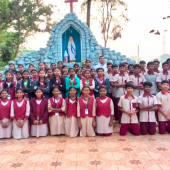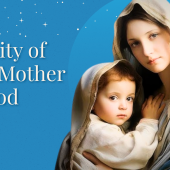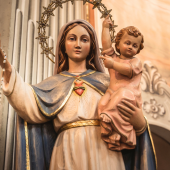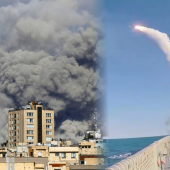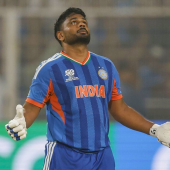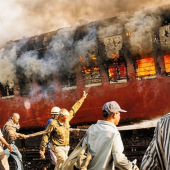Whispered Rosaries, Silent Resistance: Mary’s Queenship in Persecuted India
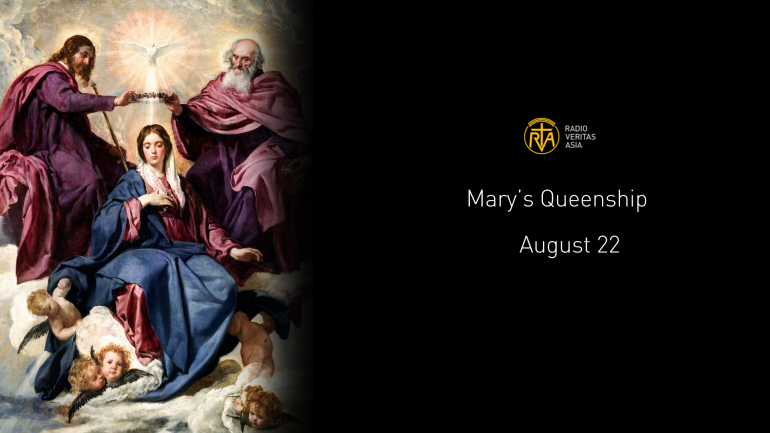
In villages across India, Christians gather in secret to pray the Rosary. Their voices whisper ancient prayers to Mary, Queen of Heaven, as threats loom outside their doors. Every August 22nd, Catholics worldwide celebrate the Queenship of Mary with joy and reverence, but for India’s persecuted believers, this feast carries the weight of survival itself.
Established by Pope Pius XII in 1954, the celebration honors Mary’s unique role as mother to Jesus Christ, the King of Kings. Its biblical foundation runs deep, when the angel Gabriel announced that Mary’s son would inherit David’s throne and reign forever, he revealed her destiny as queen mother. The Book of Revelation offers an even more striking image: a woman clothed with the sun and crowned with twelve stars, representing Mary in her heavenly glory. For India’s 28 million Christians, these aren’t merely theological concepts but lifelines thrown to drowning souls.
In India, devotion to Mary pulses with particular intensity. Millions make pilgrimages to Marian shrines like Vailankanni in Tamil Nadu, where the Basilica of Our Lady of Good Health stands as a beacon of hope. These sacred places offer more than worship; they provide refuge and strength for a community under pressure. When persecution threatens to overwhelm, Mary’s protective presence offers comfort that transcends human understanding.
The numbers tell a devastating story. The United Christian Forum documented over 700 incidents of anti-Christian violence in 2024 alone—churches burned, pastors beaten, families driven from their homes. In states like Uttar Pradesh, Chhattisgarh, and Madhya Pradesh, anti-conversion laws have become weapons of oppression, their vague language used to criminalize acts of worship, charity, and simple expressions of faith. A pastor baptizing a convert can face arrest. A church distributing food to the hungry can be accused of “forced conversion.”
The cruelty extends beyond official persecution. Many Indian Christians come from Dalit or tribal communities already crushed by centuries of caste discrimination. Their conversion to Christianity brings not freedom but double punishment, abandoned by their birth communities, hunted by Hindu nationalist groups who brand them traitors to their motherland. Families face economic boycotts that leave children hungry. Neighbors who once shared meals now cross streets to avoid them. Wedding invitations stop coming. The social fabric tears, leaving Christians isolated in a sea of hostility.
Hindu nationalist organizations like the Rashtriya Swayamsevak Sangh promote narratives that portray Christians as threats to national unity. This propaganda fuels grassroots hostility, turning neighbors against neighbors and transforming Christian festivals into potential flashpoints for violence. Even Christmas and Easter celebrations sometimes face disruption from organized protests or attacks.
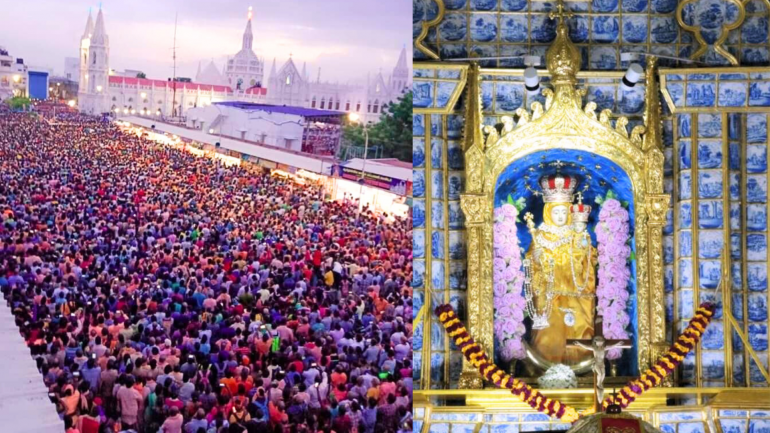
Into this darkness steps Mary, Queen of Heaven and refuge of the desperate. Her own story, unmarried pregnancy in a conservative society, fleeing as a refugee, watching her son tortured and killed, mirrors the anguish of India’s Christians. When Mary said “Let it be done” to Gabriel’s impossible announcement, she chose faith over safety, love over comfort. That same courage beats in the hearts of believers who risk everything to gather for worship.
At Vailankanni in Tamil Nadu, pilgrims flood the Basilica of Our Lady of Good Health, their tears mixing with candle wax as they beg for protection. Known as the “Lourdes of the East,” this shrine transcends denominational boundaries; Catholics, Protestants, and Orthodox Christians unite in desperate devotion to their Queen. These aren’t tourist destinations but emergency rooms for wounded souls, places where Mary’s maternal love becomes tangible in a world that has forgotten mercy.
The resistance takes many forms. In 2023, when ethnic violence exploded in Manipur, targeting Christian tribal communities with particular viciousness, Catholics organized Marian prayer rallies that became both worship and defiant protest. Their rosaries became their weapons, their hymns their battle cries. Christian schools and hospitals continue serving people of all faiths even as mobs threaten their gates, proving through action what they proclaim in prayer, that love conquers hatred, that service transcends sectarian division.
Every whispered “Hail Mary” becomes an act of rebellion. Every clandestine gathering for Mass becomes a declaration that Christ’s kingdom cannot be silenced. When Hindu nationalist propaganda paints Christians as foreign invaders, these believers respond by demonstrating their deep roots in Indian soil, their love for the land that rejects them.
Mary’s queenship offers something beyond comfort; it promises victory. Her reign reminds India’s Christians that earthly kingdoms rise and fall, but heaven’s reign endures forever. In a nation increasingly torn by religious hatred, her universal motherhood points toward a future where all God’s children can find refuge under her protective mantle.
The Queen walks with her subjects through fire, transforming their suffering into strength, their persecution into purpose. For India’s Christians, August 22nd isn’t just a feast day, it’s a rallying cry from heaven itself, a reminder that their Queen fights alongside them in battles both seen and unseen.
Radio Veritas Asia (RVA), a media platform of the Catholic Church, aims to share Christ. RVA started in 1969 as a continental Catholic radio station to serve Asian countries in their respective local language, thus earning the tag “the Voice of Asian Christianity.” Responding to the emerging context, RVA embraced media platforms to connect with the global Asian audience via its 21 language websites and various social media platforms.









